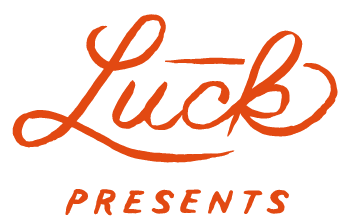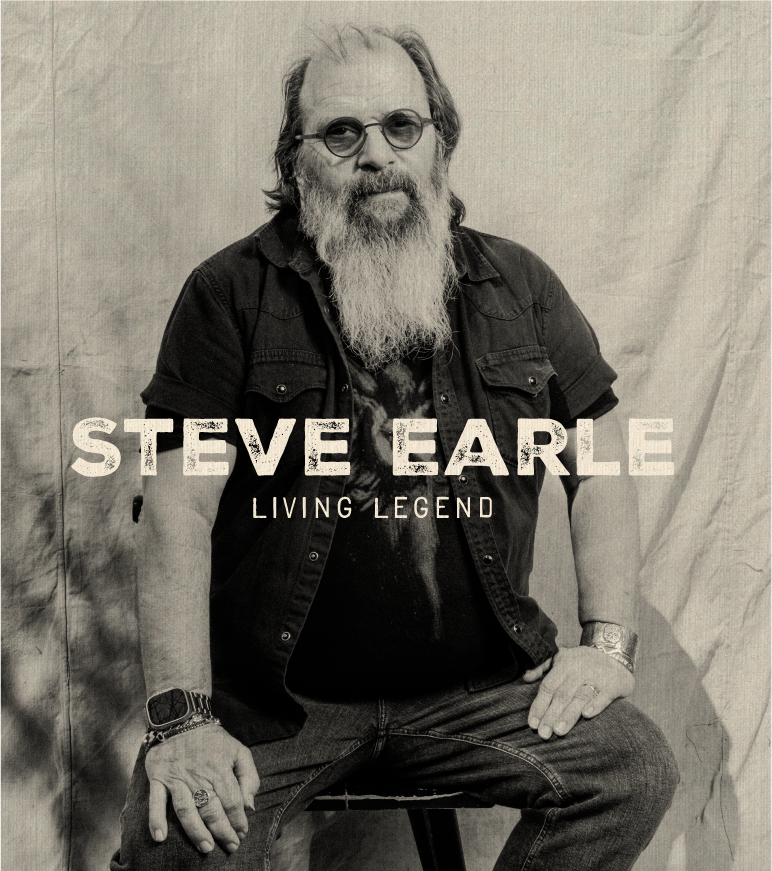Steve Earle: Living Legend
Interview by Will Schube
How has this event changed over the years that you've been involved?
That’s the thing. It hasn't changed that much. They've always kept it pretty much the same size. They have to change things from time to time just to deal with people being too nice and letting too many people backstage. The people that run this, they're friends of mine. I try not to be involved in dragging more people in. I got invited to do a Guitar workshop in The Chapel this year. I was really proud of it. I thought it went really well.
What’s the communal aspect of this for you?
I have a name in the Willie Nelson world. I have a nickname. I'm The Real Guy. One of the founders, she’s Willie's grand niece. Her mother was the biggest Steve Earl fan in the world. And Willie played the Highwaymen’s version of “The Devil's Right Hand.” She said, ‘I dunna, I like it better by the real guy.’ So ever since then, every time I got around Willie, it’s ‘Oh, here comes the fucking real guy.’ It kinda stuck. But I've done a lot of Farm Aids and a lot of Luck Reunions. Willie is such a big part of the music that I play with everybody. Plus, he saved my life. I grew up here and he moved back here in the mid-70s. I was getting my ass kicked every day and my hair cut with a pocket knife and all kinds of shit. Willie moves back, and all of a sudden I'm standing in a cow pasture listening to bands with the same guys that used to kick my ass.
This place was not headed towards the place it has become. We thought it was going to be Southern California. It was becoming so diverse and so cosmopolitan. When you landed for South By Southwest and you walked past that statue of Barbara Jordan in the airport, that's the Texas I left in 1974. What the city has become is kind of shocking to me. I'm kind of an old fart about some things. When I walk into a Mexican restaurant and I see black beans, I turn around and walk out.
These days, do you get recognized more for your music or for your role in The Wire?
If you're white, probably music, If you're Black, definitely The Wire. I'm more widely recognized for The Wire all over the world without a doubt. It's a cool thing to be part of because it was such a unique piece of literature, just the way David Simon writes. He's a friend of mine and I've learned a lot from him. The reasons he does what he does…he's very similar to me. He does things for the right reasons and tries really hard to make the world a better place.
You write for the same reasons.
Just to be a mirror for the things that are going on around us, with some empathy. My job, the songwriting job, is about empathy. People don't care about what happened to you. They care about what happened to you that happened to them, too. That’s the first lesson to learn about doing this successfully from an artistic standpoint. I've been really lucky. I've had great teachers.
Before I started recording, we spoke a bit about being a parent in 2025. How difficult is it with what’s happening in the world?
The way I'm doing it now is different. I’ve got my kids, but I’ve got step kids, too. People that grew up in my house that I'm not related to by blood, that I'm really close to. I've got three natural children. They're all boys, and I lost one. One has autism and one lives here in Texas and he's got two kids of his own. I don't think of it any other way than I always tried to be the best I could be. I was a pretty good dad for a junkie when Justin was growing up. But, I was a junkie and I traveled a lot. I did this for a living and it wasn't lost on him or my other boy, how much more present I am as a dad now, simply because I'm sober.
Does your older son talk to you about you being sober now versus when you were raising him?
We talk about it. He and I are pretty close and we talk a lot now.
I know your son is in the baseball industry. Are you a big fan of the sport?
Oh yeah. I’ve rooted for the Yankees my entire life.
Ah. I’m a diehard Mets fan.
Most of my friends are, too, but I didn't get a choice. There was no baseball in Texas when I was growing up. There were no Mets. We didn’t get baseball until the time the Mets came into existence. You got the Yankees or the Dodgers on the game of the week. There was Dizzy Dean and Pee Wee Reese. My granddad was from northeast Texas but he got discharged from the Army in New York City. He was dragged home kicking and screaming to run the family hardware store when his stepfather died. He came back as a Yankees fan. I was issued pinstripes when I was six years old. I’m a Yankees fan. I bleed pinstripes. I love that.
Guitar Town turns 40 next year. What’s your relationship like with that album now?
I still play those songs every night I’m on the road. I play “Guitar Town” every night. I play “Copperhead Road” every night. I play “My Old Friend The Blues” almost every night. I'm really proud of that album. There are things that I would do differently about the way it sounds, but I wasn't that involved in that part of it. I was just trying to write good songs. But I still play those songs. It pisses me off when Radiohead doesn't play “Creep.” I don't understand. Why would you not play that? Dance with the one that fucking brought ya?
Has your perspective on the songs changed at all?
The songs are supposed to change. I don't think about it. I just write. I got lucky and I had a couple of revelations early on. I was playing a benefit in between Exit Zero and Copperhead Road. It was this thing called the “Pass It On” show. There was a chairman, and that year it was Johnny Cash. Johnny asked Waylon Jennings to play, Waylen Jennings asked me. Waylon was a big deal to me. He wore a bandana on his wrist every show that he did while I was in jail. He was very supportive. He recorded “The Devil's Right Hand” twice. I’d met Cash before, but that night he came all the way across the room and he said, “I've been meaning to tell you that I really liked that song of yours, ‘Little Rock ‘N’ Roller.’ It's a song on my first album, and it's about Justin — the period of time when me and my wife had split up, my first born kid, and I ended up leaving that home. I just walked around with my chest popped out because Johnny Cash said he liked my song. I got on a bus a couple nights later and we were headed to Texas, going through Arkansas. We stopped for fuel and everybody else was asleep.
I wanted to go there to get a cheeseburger, so I sneak off the bus, I go get a burger in a bag, bring it back, and I'm walking back to the bus and a truck driver that pulled up next to us while I was out, he said, ‘Hey, are you Steve Earl? I really liked that song, ‘Little Rock ‘N’ Roller.’ A light went off. What did Johnny Cash, this truck driver, and I have in common? We had kids and we miss 'em when we’re on the road. That was when I realized this job's about empathy. It governs a lot of what I do when I do this job.
It’s more important now than ever before.
Probably, yeah. I'm a hardcore lefty. My politics are what they are and I don't apologize for it, but I do think the left is absolutely guilty of losing touch with and alienating the working people they're supposed to be standing up for.
We could talk about this all day. It’s been a while since you released solo music. Are you itching to make something new?
I've been writing this musical, so that's where the songs are going. I'm writing a musical of Tender Mercies. I've been working with it for four years. I may release an EP of some of the Tender Mercies songs, but it just takes a long time to get a musical together. The last record I had of original material was in 2020. I've been writing songs, it’s just all been for the musical.
Does it scratch the same creative itch for you as putting out records?
The older you get, the more you got to find reasons to write. They call the things artists do disciplines for a reason. Nobody's going to tell you to go punch a clock at a certain time and it gets harder. I've watched too many writers stop writing when they get to be a certain age or when they get too comfortable. That terrifies me. I just do whatever I have to do to find a reason to write. Sometimes writing a project's a great way to do it. I write for movies, I've written for television shows when I'm asked to. I like doing it because it gives me a project. There's not always something that's bugging me enough that I want to write a song about it.
Is there a legacy aspect to it as well?
Sure. The things I do for legacy are more like, I play the Grand Ole Opry on a regular basis. I want to be a Grand Ole Opry member before I die. I play it once a month except for the summer. Being in the National Songwriters Hall of Fame is a big deal to me. I'm very proud of that. I'm in the Texas Heritage Songwriters Hall of Fame. I was inducted the same night as Bobbie Nelson. That kind of stuff is important to me. My legacy is going to be two songs. “Copperhead Road” is the new “Cotton Eyed Joe.” It is the one surviving line dance song. Long after I'm gone, “Galway Girl” will be part of Irish culture. It's played at every wedding and I'm really proud of that. That song will definitely be remembered after I'm gone.


